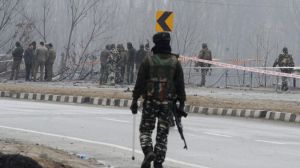Heartburn over Scorched Earth
...

|
Hiten Trivedi, 32 Purnima Thakre-Trivedi, 26 Rashmi Trivedi, 66 Hansa Trivedi, 63
|
IN the cool spacious apartment facing the sea, the Trivedis relax over post-lunch thandai, contemplating the heated atmosphere beyond their walls. No, not just outside their Marine Drive residence, but in their homeland of Gujarat, which continues to simmer with lingering violence.
Both Rashmi (66) and his son Hiten (32) work independently from home. But links with Gujarat remain strong. ‘‘Most Gujaratis are businessmen, as they can’t work under less intelligent people,’’ smiles Rashmi, a stockbroker. While wife Hansa (63) gave up teaching when she married and moved to Mumbai, Hiten and his wife Purnima Thakre-Trivedi (25) run an architectural firm.
In fact, Hiten studied architecture in Gujarat and work often takes the couple to Ahmedabad. Born and bred in Mumbai, Rashmi occasionally visits relatives in Bhavnagar. And Hansa’s father worked for the Nawab of Sachin before they moved to Surat. ‘‘I lived in Sayedpura, near a large Muslim neighbourhood. The school I taught at had many Muslim teachers and students, who even attended my wedding. My best friend Mumtaz was a Muslim, and we’ve often stayed with each other,’’ she smiles. Her husband reflects this attitude. ‘‘Though we’re Brahmins, I lived with a Pakistani family while in Dubai. They were originally from Saurashtra, spoke Gujarati and even made vegetarian food for me,’’ he recalls.
Echoes Hiten, who spent a year travelling through Gujarat’s villages on a government project: ‘‘All the villagers look the same, speak the same. Only when you see the mosques, do you realise there are Muslims here.’’
The family fiercely believes that the riots are a result of the politicisation of the action of a section of trouble-makers. ‘‘Neither Muslims nor Hindus are interested in creating problems. Of course, there are bad elements on both sides. And certain parties have taken advantage of this,’’ believes Hansa, who was recently in Ahmedabad to visit an unwell niece. In fact, Hiten and Purnima were scheduled to travel on the Sabarmati Express to Ahmedabad on February 28, a day after the Godhra incident. Surprised when it didn’t arrive, they adopted another route to Ahmedabad. After working indoors throughout the day, it was only when Hiten and Purnima attempted to step out in the streets that the situation caught up with them. ‘‘I’ve never seen so much fire in my life — shops, vehicles and buildings burning,’’ shudders Purnima, a Maharashtrian. ‘‘In that atmosphere, you just fear mobs — of any community. You see a crowd approaching and feel like running.’’
Despite voicing these politically correct views, the Trivedis have felt the impact of the riots in Mumbai too. While the older duo deny that it has affected them deeply, the younger couple isn’t so sure. ‘‘Some of my Muslim friends have rather pointedly asked me how I feel about this; whether my family hates Muslims. We’ve been friends for so long; community wasn’t even an issue. So why should these questions come up,’’ Purnima protests.
Within the community too, there is often some explaining to do. ‘‘I’m sometimes asked why I haven’t reacted yet. But I’m not bothered by these armchair revolutionaries. I just shoot back a few questions, for which they have no answers,’’ dismisses Hiten. While he always attempts to argue out his opinions, Rashmi believes it’s pointless. ‘‘There is always a percentage of people who are conservative, who label Muslims as cruel. There’s no use trying to convince them, their ideas won’t change. I just don’t bother. An intelligent person must see these things for himself,’’ he shrugs.
But none of them can deny that the unceasing unrest is leaving blemishes that will be hard to erase. Recalling his fear during the Ahmedabad visit, Hiten points out, ‘‘An erosion of trust is inevitable. Discipline is on a down-spiral. The people of Gujarat are so habituated to violence that anything can make them go haywire.’’
Rashmi adds, ‘‘No one can now predict where violence will erupt, even if one avoids the ‘dens’ of either community.’’ And Purnima admits, ‘‘Logic tells you it’s all a political farce. But still questions and irrational fears are born in your mind, especially when you’re in ‘sensitive’ areas.’’ As Hansa sighs, ‘‘We do read about families helping friends from the other community. But what was so normal has now become unusual. The state has gone back 10-20 years, because of this. And it will take a long time for things to heal.’’
Photos





- 01
- 02
- 03
- 04
- 05


























